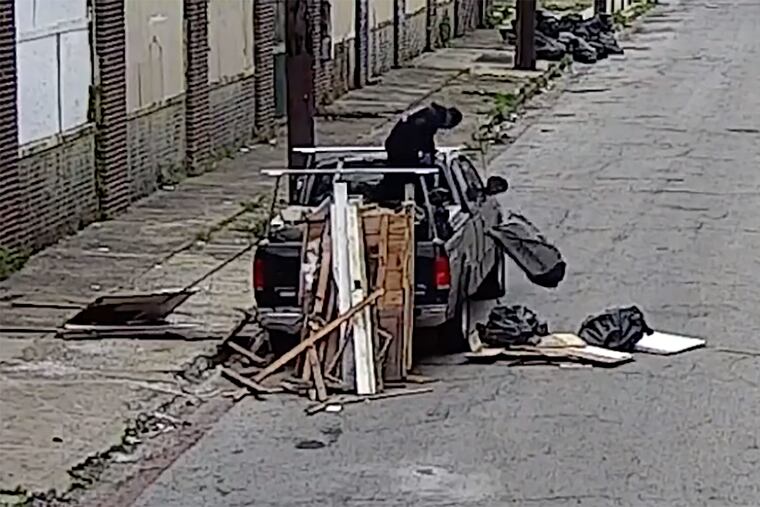Philly is trying to stop illegal dumping by tracking who hauls contractors’ trash
Starting Oct. 1, contractors wanting construction or demolition permits have to tell the city who's hauling away their trash. Philly officials think it'll reduce illegal dumping.

In Philadelphia, it’s not uncommon for a small or mid-size contractor needing to dispose of construction debris to hire a guy down the block with a pickup truck. The guy may or may not be registered as a business with the city.
Officials say that contributes to the problem of illegal dumping of construction debris throughout the city, and they’re changing how they issue construction permits in response.
“People are entrepreneurs,” said Nic Esposito, director of the city’s Zero Waste and Litter Cabinet. “They’re trying to make money, diversify their business, which is awesome. We’re just trying to make sure they’re doing the right thing” and disposing of debris responsibly.
Tackling illegal dumping among contractors has largely been a job Philadelphia does after the fact. Workers sift through mountains of construction debris looking for clues that point to the culprit. They review surveillance camera footage after someone dumps. The city issues fines of up to $2,000 for heavy illegal dumping.
Starting Oct. 1, anyone applying for a permit for construction, demolition, or major alterations to a building has to tell the city which company is responsible for taking away the rubbish. Applicants must select their haulers from a city registry. The idea is to make sure contractors taking advantage of the city’s construction boom are working with reputable haulers that use approved disposal facilities.
The applicant and the trash hauler also must keep receipts from the disposal for three years, so the city knows where waste is going. If the city suspects a construction site is dumping, it can cross-check the receipts.
Better oversight and regulation of waste disposal is part of the city’s larger plan to cut down on illegal dumping, city officials said. The city also continues to install surveillance cameras, issue fines, and publicize enforcement. Officials said they also are exploring how to identify and find uses for vacant lots that serve as constant dumping grounds.
Within the next few months, the city also will require tire dealers to choose a hauler from a state registry of tire haulers in order to get the specialty license they need. As with contractors, tire dealers and their haulers will need to keep disposal receipts.
The city received more than 3,700 reports of “heavy illegal dumping” between May 2018 and June 2019. Cleaning up dumping sites costs Philadelphia more than $8 million per year, according to the city’s most recent estimate.
>>READ MORE: ‘Eye-popping’ 245-ton illegal dump cleared near Philadelphia drinking water intakes
But developer Ori Feibush said he’s skeptical that the city’s new plan to tweak the permit application process will reduce short dumping.
“It doesn’t resolve the underlying issue, which is bad actors,” he said. “There’s certainly opportunities to resolve this, but it’s not the permitting issue.”
He said that in his experience, “it’s generally small-time renovations that are creating the greatest aggravation,” and the same few people are doing the majority of the dumping. That includes people working small jobs who don’t get permits or who undersell the job to the city and purposely get the wrong permits. Others clean out a home, which doesn’t require any of the affected permits, and leave unwanted materials on the street.
Feibush said if the city arrested those “bad actors,” fined them tens of thousands of dollars, and took their trucks, the city would alleviate the problem.
>>READ MORE: Video: Illegal dumpers shove construction debris, trash right onto Philly roadways, sidewalks
At the end of June, the city had installed 50 of the 100 surveillance cameras it plans to have up by the end of the year specifically to catch and prosecute dumpers. Officials use a litter index to track conditions across the city to drive policy.
In Northeast Philadelphia, trash piles up right outside the facility where Revolution Recovery collects construction debris and recyclables from haulers large and small, said Fern Gookin, the company’s director of sustainability.
“For contractors, maybe there is a disconnect about what happens” after they hire someone to haul their trash, she said. So with the new permitting regulation, “maybe now it’s bringing some additional light to the fact that maybe it’s not always going where you think it’s going.”